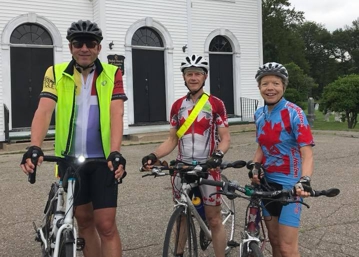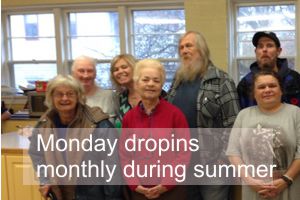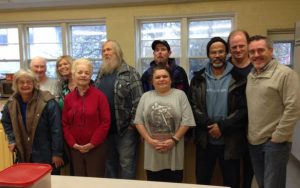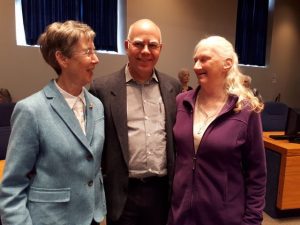Bishop Rob Hardwick of the Diocese of Qu'Appelle rode into Fredericton on Sunday just after 2:30 p.m. on Sunday July 15th. His partner on the pilgrimage has been his wife Lorraine who drives the support vehicle. The Cathedral was so pleased to welcome them, and right on schedule for the planned event.
About a hundred were in attendance, from the congregation and the wider community. A 4:00 p.m. informal evening prayer was followed by a BBQ on the cathedral green.
"We so much appreciate the support of our partners," said Dean Geoffrey Hall. Christ Church (Parish) Church has been involved. We also value the contributions of Joy FM, and others named on the promotional flyer.
It was an uplifting afternoon of music, prayer and food. During worship, Bishop Hardwick shared some reflections on the meaning of his journey "to lay a foundation of prayer for unity, healing and reconciliation." "There is so much need in this broken world of ours," said Bishop Rob. "It seems we talk a lot about prayer but its another thing to do it."
Visit the Cathedral Podcast page to listen to the 4:00 p.m. worship with the Bishop's address.
To lay a foundation of prayer for unity, healing and reconciliation ...
The Bishop and Lorraine invite others to join them in their effort in at least three ways:
- Use the Prayer Diary to follow along day by day as the ride comes to its conclusion on 01 August in St. John's Newfoundland. There are special prayer intentions listed for each day and a schedule for the stops along the way. You can be a prayer partner wherever you are.
- Follow the Ride on Facebook or the Bishop's Ride blog to get updates and reports on progress
- Make a contribution to the Living the Mission Financial Campaign. Find information in the Prayer Diary for sending a cheque or money order or click the donate button on the Facebook page or the Bishops Ride web page
- Ride with the Bishop as he leaves from the North Side Tim Horton's (534 Union Street) at 7:30 a.m. on Tuesday, 17 July.
On Monday morning, Bishop Hardwick was the feature interview during the Joy Ride, 7:30 - 8:30 a.m. on Joy FM. Later that morning, a pit stop at Savage's Bicycle Centre got the cycle in for a tune up to prepare for the final leg of the pilgrimage.
More information on the Bishop's Bike Ride can be found easily by searching "Bishop's Bike Ride Living the Mission" or from the previous post on the Cathedral web site.



















